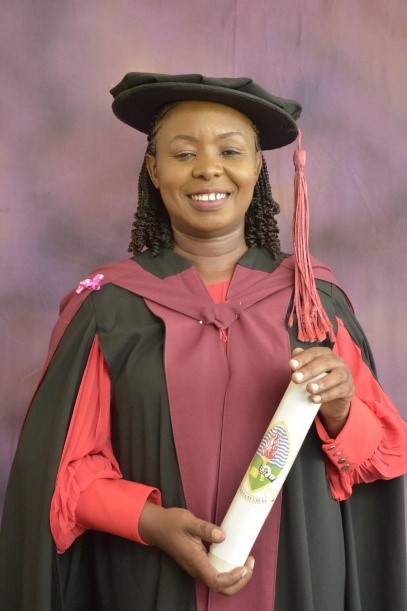News
 We are thrilled to announce that Dr. Olipa Simon, our esteemed staff member of the Institute of Resource Assessment (IRA), has successfully completed her PhD. Her remarkable achievement stands as a testament to her dedication, hard work, and unwavering commitment to the field of Geographic Information Systems (GIS) and Remote Sensing
We are thrilled to announce that Dr. Olipa Simon, our esteemed staff member of the Institute of Resource Assessment (IRA), has successfully completed her PhD. Her remarkable achievement stands as a testament to her dedication, hard work, and unwavering commitment to the field of Geographic Information Systems (GIS) and Remote Sensing
Dr. Olipa Simon's thesis, "The Impact of Urbanization on Land Surface Temperature Changes in The Dar es Salaam Metropolitan City, Tanzania," explores the impact of rapid urbanization on land surface temperature (LST) in Tanzania. Her study reveals significant changes in land cover, with a decline in natural areas like bushland and forests (-17.47% combined) over the past 27 years (1995–2022). This decrease coincides with a rise in built-up areas (14.87%) and agricultural land (4.47%). Dr. Simon employed innovative techniques such as satellite image analysis using Google Earth Engine and Random Forest classification to quantify these changes. Social science methods, including key informant interviews and focus groups, identified unregulated urban sprawl, informal settlements, rural-to-urban migration, and inadequate planning as significant contributors to these transformations.
The study establishes a strong correlation between urbanization and rising land surface temperature (LST). A Geographically Weighted Regression analysis revealed that population density and proximity to the city centre are major influences (R²=0.73), suggesting that urbanization is a key driver of LST increases. This finding, coupled with the negative correlation between LST and vegetation and the positive correlation with built-up areas, highlights the urgent need for proactive measures to mitigate the urban heat island effect.
The findings of her research, particularly the relentless growth of built-up and agricultural areas predicted by the Cellular-Automata-Markov-Chain (CA-Markov-Chain) model by 2050, underscore the urgent need for proactive land-use planning strategies. These strategies are crucial for mitigating the trends of rapid urbanization and their associated temperature rise. The study's focus on population density and city centre proximity during urban planning provides a clear roadmap for sustainable urban development in Dar es Salaam as the city faces climate change.
Her academic Profile
Dr. Olipa Simon Mwakimi is a highly accomplished scientist with a distinguished career in Geographic Information Systems (GIS) and Remote Sensing. She serves as the Principal GIS Laboratory Scientist at the Institute of Resource Assessment, University of Dar es Salaam (UDSM), Tanzania. Dr. Olipa holds a PhD in Natural Resources Assessment and Management from UDSM, adding to her outstanding academic achievements in Computer Science (Masters) and a BSc in Land Surveying (Geomatics), both with First Class Honors from UDSM. Her academic excellence is further highlighted by various awards, including the Ministry of Science and Technology award for best final year student and the National Construction Council Best Female Student prize.
With over 20 years of experience at UDSM, Dr. Olipa has specialized in advancing GIS and Remote Sensing. As Principal GIS Laboratory Scientist, she provides theoretical and practical training for postgraduate students, develops specialized short courses, and offers consultancy services in GIS and Remote Sensing applications. Her expertise is recognized in numerous high-profile projects, including serving as a National Consultant for the FAO Forest Area Change Project, being appointed by the Ministry of Natural Resources and Tourism for Tanzania's National Forest Resources assessment, and contributing as a GIS/Remote Sensing Expert to the development of National Forest Reference Emission Levels and National Land Cover Mapping. She is currently a member of the task force preparing Tanzania's 4th National State of the Environment Report.
Dr. Olipa is a published researcher with five lead articles in peer-reviewed international journals on topics such as the impact of urbanization on land surface temperature, land use and cover changes, and the socioeconomic factors influencing these dynamics. She maintains active profiles on Google Scholar, ORCID, Academia, and ResearchGate under Olipa Simon and Olipa Mwakimi, and is involved in several international organizations, including the African Association of Remote Sensing for Environment (AARSE), Women in Geosciences and Engineering (WIGE), and the East Africa Geospatial Forum. Her career at UDSM began in 2003 as a GIS Laboratory Scientist and has progressed to her current leadership role, exemplifying her dedication to advancing GIS and Remote Sensing for natural resource management in Tanzania.
Other News
Tue, 11.Jun.2024 : Congratulations to Dr. Ritha Kalokola on Completing her PhDTue, 11.Jun.2024 : CONGRATULATIONS...Dr. Fasco Chengula, for successfully defends his PhD in Environmental Anthropology at the University of Roehampton-London, UK.
Tue, 11.Jun.2024 : CONGRATULATIONS...Dr. Grace Malley, for successfully defends her PhD in Geography at Pennsylvania State University- USA.
Tue, 12.Sep.2023 : Congratulations Prof. Pius Zebhe Yanda
Wed, 16.Dec.2020 : From 5th to 16th October 2020 IRA conducted Introduction to GIS short course with people of Zanzibar Urban Municipal Council

